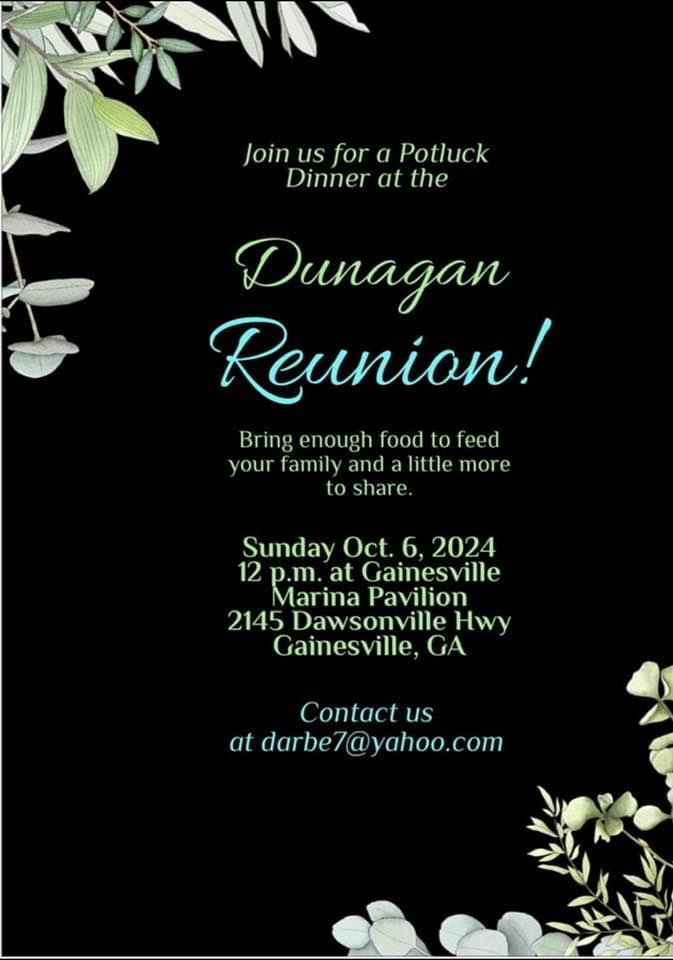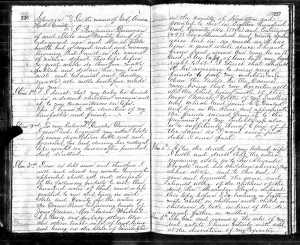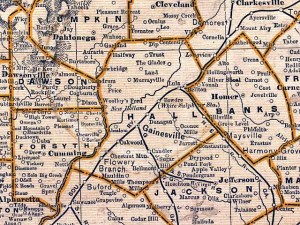During the 1830’s my ancestor’s continued to be actively engaged in the building and establishing of Hall County Georgia. It had been sixty years since Joshua Dunagan and his brother Joseph Dunagan (my fifth great grandfather) had brought the first group of settlers into what is now known as Hall County Georgia. The site of their settlement was located near present day Gillsville and was known as Stonethrow. It was a remote frontier located in hostile Indian Territory and even though it has grown and prospered in those sixty years it still remained a remote area that required much from those who lived here during the 1830’s.
The occupation and livelihood of most of its population was chiefly agricultural. Life was hard and laborious work was required to survive and prosper. Social life was largely limited to church and church related social events. Occasional special events would find themselves on the calendar from time to time.
One such special event of the year was the celebration and observance of Independence Day. Hall County citizens gathered to enjoy good food, good company, and hear political speeches orated by the citizens and special guest. The first Fourth of July celebration recorded in Hall County was in the year 1833. The celebration began at the square at 11 o’clock with a procession headed by Major General Bates, his staff, and the officers of the day. They were escorted by the Gainesville Hussars to the Baptist Church where the many citizens were gathered. Reverend Parks addressed the group, followed by a reading of the Declaration of Independence by David C. Neal, Esq., after which an oration was given by Mr. James W. Jones.
The celebration continued into the afternoon with much of the activity held at the Limestone Springs. Limestone Springs was located at what we know today as the intersection of Green Street Circle and Thompson Bridge Road (named so because of the original covered bridges built by Andrew Thompson’s sons).
The dinner, which was prepared by Mr. Joseph Frederick, was enjoyed by the Gentlemen at the Springs. Presiding over the program was a Mr. Rueben Thornton and his assistant Madison R. Mitchel. Formal toasts were offered followed by volunteer toasts from the gathered guest.
There were many “Volunteer Toasts” given that day but for purpose of interest, I am only quoting those pertaining to the Dunagan family.
“By Joseph Dunnagan Esq. – ‘May that patriotism that animated the Heroes of the Revolution be perpetuated in the hearts of their descendants, and may peace and good will abound among every portion of our Citizens, from Main [sic] to Misourie [sic].’ “
“By Joseph Dunnagan Esq. – ‘The protective system; originally advocated by some Southern men, and now strange to tell, the same men are the foremost to advocate unconstitutional measures to get rid of.’ “.
“By Mr. B. Dunnagan – ‘Detested be every…pendant such as the palmetto flag, with all that rally round them, but let all true hearted Americans rally round our star spangle banner emblem of our Union, and long may it wave o’er the land of the free and home of the brave.’ “.
The Independence Day festivities were the spotlight of the political season, the following account is of the 1840 celebration in Hall County Georgia. The celebration began that morning with an assemblage of the citizens at the Court House and a walk to the Academy Spring, where they heard a reading of the Declaration of Independence by Joseph Dunagan and a speech by T. C. Hackett. Keeping with tradition, they partook of an appetizing meal prepared by Wiley Sledge. The preset toasts were once again delivered followed by the volunteer toasts. As said before, many toasts were given that day, but I will quote those only from the Dunagan family.
“By James McClesky [husband of Anna Dunagan], a revolutionary war soldier, May the Lord, with the breath of his mouth, destroy that evil spirit that is now about to enter into the hearts of some of the offspring of our noble soldiers, who fought and bled under the flag of the U.S. and declared themselves independent of Great Britain on this ever memorable day.”
“By James McCleskey – Georgia; On the first Monday in November, she will load her big gun with Democratic principles, wadded with Republicanism, and leveling it at Federalism, will blow Wm. H. Harrison sky high.”
“By Benjamin Dunagan – Maj. Croghan; who so bravely defended Fort Stevenson, contrary to orders of cowardly commander. May he ever be esteemed by the American people as a hero and patriot.”
“By Jas. R. Dunagan – A strict construction of Federal constitution is the sheet anchor of this Government.”
The Dunagan’s of Hall County Georgia have been actively involved in the community and its government since their arrival here in the 1790’s. That tradition continues even today. Callier Daniel ‘Danny’ Dunagan, the third great grandson of the aforementioned Joseph Dunagan resides today as mayor of Gainesville. Sandra Dunagan Deal, wife of Governor Nathan Deal and the third great granddaughter of the aforementioned Joseph, is the honored First Lady of Georgia.
May we always remember the great men from whom we came and do honor to them as they did us. I pay tribute to my forefathers and those whom have fought, served, and labored to build and preserve this great nation of ours.
Joseph Dunagan – He came into Georgia about 1790 and built Dunagan or Donnegan Station in old Franklin County Georgia. A leader among the settlers, he and his brother Joshua lead the settlers into Indian territory where they established the first settlement known as Stonethrow.
Ezekiel Dunagan – A pioneer and founding settler of Hall County, Georgia and a veteran of the War of 1812. Ezekiel served as a spy during the war and his name can be found on the roster hanging in the Georgia State Archives.
Joseph Ellis Dunagan – “Old Constitution” a Georgia State Senator representing Hall County for 23 years and a valiant and staunch defender of the Constitutions of the United States and Georgia.
John Franklin Dunagan – A Civil War Veteran who was also taken prisoner during the war.
Joseph Alexander Dunagan – Born in 1862 while his father was fighting in the Civil War, he was too old to fight in WWI. He came from patriotic men and he raised patriot men.
Lester Commie Dunagan – A proud American who was a veteran of WWI
Lester Commie Dunagan Jr. – My father, who fought bravely in WWII and continued his service to his country for the remainder of his life. Serving as First Sergeant in the Georgia National Guard till retirement, serving as Commander of the Paul E Bolding Post of the American Legion and serving as State Commander of the Georgia American Legion, he was the most patriotic man I have ever known.
Matthew L. Scruggs- Continuing the tradition is my son who served in the United States Air Force and the Air National Guard with a tour in Iraq. His service left him disabled and hero always in my book.
This is just one line of the great defenders of freedom from which I descend. I am honored to be able to trace my roots back to the beginning of our Great Nation and say those were my ancestors. It is to them and men like them that we owe our freedom!
*Information on the Fourth of July Celebration was taken from newspaper microfilm found in the Hall County Library and was transcribed as written.*




















